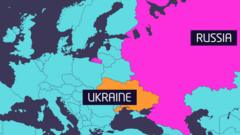Ukraine: Russia say they have won 'sham' referendums
- Published
- comments

Russian officials say they have won four referendums in Ukraine - but many countries around the world have called them a "sham", meaning a thing which is not what it is supposed to be.
A referendum is supposed to be a vote which all adults can take part in, normally giving a "Yes" or "No" answer to a question, with the winner earning more than half of the votes.
Over the last week nearly four million people living in eastern Donetsk and Luhansk and southern parts of Kherson and Zaporizhzhia were asked to vote in a referendum, on whether they want to join the Russian Federation, or to stay part of Ukraine.
War in Ukraine: Everything you need to know
The areas are currently under Russian control, and it has been reported that Russian soldiers armed with guns accompanied the people collecting votes as they went to people's houses.
This means many people would have felt they could not vote freely for what they actually wanted to happen.
The referendums were described as a 'sham' and 'illegal' by Ukraine's government and its allies.

Pro-Russian news agencies in Donetsk and Luhansk have said that up to 99.23% of people voted in favour of joining Russia.
Speaking about the vote, Ukrainian president Volodymyr Zelensky said: "This farce in the occupied territory cannot even be called an imitation of referendums."
Why are people concerned about the results?
Many people are worried that the war in Ukraine may now get worse, as a result of this referendum.
This is because people think that Russian President Vladimir Putin may soon announce that the four areas that took part, would be annexed.
What does annexation mean?
Annexation is when a country decides it now controls another area, without the agreement of the people involved or anyone else they might need to get permission from.
It is forbidden by international law.
If Russia does decide to annex the four regions of Donetsk, Luhansk, Kherson and Zaporizhzhia, which make up 15% of Ukraine, it could make the war worse.
This is because Russia could say that any attempt by Ukraine to get back the areas is an attack on its territory.
Ukrainian president Zelensky said that it was "a very cynical attempt to force men in the occupied territory of Ukraine to mobilise into the Russian army in order to send them to fight against their own homeland".

In a televised speech last week, President Putin announced that he will ask around 300,000 Russian military reservists - people who are not currently in the army but have had experience with the army or previous training - to join the war in Ukraine.
He said that this was necessary to defend Russia and Russia's territory.
Since the announcement there have been protests against the the new rules, and thousands of people have begun to flee the country.
The Russian government - sometimes called the Kremlin - has also introduced rules that means that desertion, surrender, and leaving the army without permission, are now a crime, which means that people could be put into jail for up to ten years.
What is desertion?
Desertion is when a person chooses not to fight, and leaves the army without permission, with the intention of not coming back.

People think annexation may happen because President Putin has done something similar before.
In 2014 Russia sent troops into Crimea - which was part of Ukraine - and a few weeks later MPs there announced that they would be holding a referendum on whether to join Russia.
The Ukrainian government said this vote was against the constitution.
Of the people who took part in the vote, 96% chose to join Russia - but a lot of people did not vote.
Russia's president Vladimir Putin said the vote was fair, but leaders in Europe and the United States said the vote was illegal.
President Putin signed a treaty to make Crimea part of Russia on 18 March 2014.
History between nations
Ukraine used to be part of the Soviet Union, a group of states ruled from Moscow, in Russia.
But in 1991 the Soviet Union broke up and Ukraine became a country in its own right.
Since then there has been a kind of tug of war over how the country should be governed.
What have other countries said about the situation?

The UK has responded to the referendums by putting in place more financial penalties, called sanctions, against top Russian officials who are involved in enforcing the votes.
In the US, the Secretary of State Antony Blinken said that the West would never recognise Russian annexations, and warned the Kremlin of "additional swift and severe costs".
French Foreign Minister Catherine Colonna, who recently visited Ukraine, described the polls as a "masquerade" - which means when something pretends to be something it is not, to trick people.
In China - which is a traditionally a Russian ally - foreign ministry spokesperson Wang Wenbin said the "sovereignty and territorial integrity of all countries must be respected", when answering a reporter's question about the referendums.
President Putin has defended the referendums, saying they were designed to stop the persecution of ethnic Russians and Russian-speakers by Ukraine - something which the Ukrainian government denies.
- Published22 February 2023
- Published1 March 2022
- Published8 March 2022


